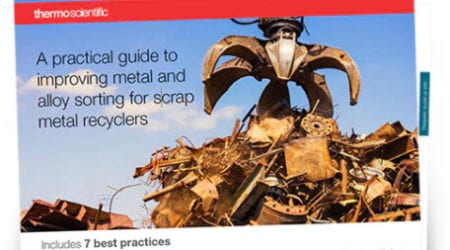 In aerospace industries, component manufacturers must ensure their products are in compliance with specifications, or a tragedy can occur. In fact, the Transportation Research Forum reported that between 1990 and 2006, 700 fatal aviation accidents occurred worldwide in commercial passenger service with numbers of casualties were reported. Equipment failure took 23% of the events, making it the top two categories which cause accidents[1].
In aerospace industries, component manufacturers must ensure their products are in compliance with specifications, or a tragedy can occur. In fact, the Transportation Research Forum reported that between 1990 and 2006, 700 fatal aviation accidents occurred worldwide in commercial passenger service with numbers of casualties were reported. Equipment failure took 23% of the events, making it the top two categories which cause accidents[1].
Positive Material Identification (PMI) of incoming raw materials helps ensure they match the alloy grade and composition documented on the material test report prior to product manufacture. Handheld XRF analyzers are especially useful to identify the newest alloys for aerospace applications. (Read New High Temperature Alloy for Aerospace Applications.)
Think of all the small components and fasteners used in the manufacture of airplanes that must be designed, fabricated, inspected, and installed properly or lives can be put at risk. For this reason, it is imperative to ensure that fasteners for these critical applications are made from the precise metal alloy called for in the design specifications. Again, this verification can be accomplished quickly, easily, and accurately using a handheld x-ray fluorescence (XRF) analyzer.
X-ray fluorescence (XRF) is a proven technology for the elemental analysis of specialty alloys to ensure the correct alloys are combined in the right percentages and the finished material meets precise manufacturing specifications. Handheld XRF analyzers are purpose-built to provide the highest quality analysis and verification necessary for the full range of aerospace alloys, including high-temp, nickel, titanium, aluminum alloys and superalloys because they can determine the elemental composition of a sample within seconds.
Below is a case study of how one airline is helping to ensure the safety of its passengers by using portable XRF analyzers.
Case Study
GMF AeroAsia, one of the biggest service providers that specializes in aircraft maintenance repair and overhaul (MRO) in Southeast Asia, takes its in-house positive material identification (PMI) process seriously.
The process used by GMF AeroAsia includes performing pre-failure analysis of failed components due to inadequate information from maintenance manual regarding material composition. The outcome of PMI will be used for further investigation of failure root cause to prevent breakdown and its costly consequences. Aircraft engineers from the Material Process Unit utilize handheld XRF analyzers to perform PMI on aircraft-related parts such as main wheels and landing gear component, bolts and metal debris from engines, and towing equipment, etc. In addition, they also perform PMI for non-aircraft parts such as industrial gas turbine and other supporting tools and equipment upon request.
Prior to using handheld XRF analyzers, samples were sent to labs for analysis and the waiting time for test results would take up to 5 days.
Handheld XRF analyzers used in manufacturing, however, not only delivers rapid lab quality results for these users but also provides true mobility. When users require a hands-free method to analyze small samples, such as bolts and nuts, the handheld XRF analyzer is paired with a portable test stand which helps position the sample. The stand contains a lightweight collapsible tripod and sample chamber that enable the manufacturer to easily transport this alternative to various sites. An integrated micro camera enables precise small spot analysis – even the smallest texts on the bolts can be read.
Because of their portability, handheld XRF analyzers can be used anywhere in the aircraft component manufacturing supply chain to improve process and quality control, including equipment manufacturers, fastener manufacturers, steel manufacturers, etc.
For additional information, visit the Manufacturing & Metal Fabrication pages of our website.
[1] Oster Jr., C.V., J.S. Strong and C.K. Zorn. 2010. Why Airplane Crashes: Causes of Accidents Worldwide. USA: Transportation Research Forum.
Additional Resources:
- Download our free eBook: A Practical Guide to Improving Steel Manufacturing Processes and Production Methods
- Visit our center for Improving Steel Manufacturing Processes and Production







Leave a Reply